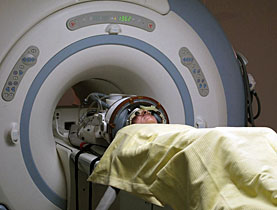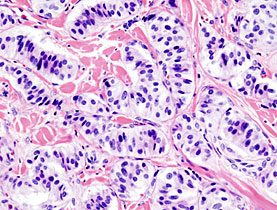Non-invasive brain surgery proves successful

Not many patients can imagine having a glass of champagne with their surgeons straight after brain surgery but that is exactly what is happening at a Zurich hospital.
Swiss doctors have successfully carried out the world’s first non-invasive brain surgery with use of high-intensity focused ultrasound (HIFU).
Ten adult patients, who were awake during the revolutionary painless procedure, have been treated at University Children’s Hospital Zurich since September 2008 as part of a clinical study. The results were published this week.
All interventions were completed successfully and without complications under the direction of professors Daniel Jeanmonod and Ernst Martin.
“This fully non-invasive procedure opens new horizons for neurosurgery and the treatment of different neurological brain disorders,” Ernst Martin, director of the hospital’s Magnetic Resonance Centre told swissinfo.ch.
The list of diseases and conditions which could be treated with this safe and effective technique includes Parkinson’s, Alzheimer’s, epilepsy, brain tumour and stroke.
Projected pain
Martin and Jeanmonod have been working on patients with neuropathic pain due to functional brain disorders. Specifically, they are people who experienced pain in amputated or paralysed parts of the body.
“The origin of the pain does not exist anymore but the brain projects the pain so that is why we operate on the brain,” Martin explained. The patients have all remained pain-free since their operations.
HIFU has been used for some years in the treatment of uterine fibroids and tumours of the prostate gland. The ultrasound beams heat up the problem area, creating a lesion and rendering it inactive.
This is the first time that the technique has been applied to the brain through the intact skull for non-invasive neurosurgery.
Breakthrough
“A major breakthrough was the MR guidance – that is image guidance of the operative process by magnetic resonance imaging and also magnetic resonance thermometry, where we get thermo maps and can see exactly the temperature development at the spot where we operate,” Martin explained.
It is common knowledge that ultrasound does not go through the skull because bone absorbs the waves. But Martin, Jeanmonod and their team managed to overcome this obstacle by creating a helmet-like hemisphere with 1,024 transducers, which can each be individually set, beaming separately into the skull.
The benefits are enormous. “We avoid the risk of bleeding, we do not harm anything on the brain, there is no intervention on the brain other than the focal spot and we have no risk of infection.”
Each beaming session lasts ten to 20 seconds with breaks of several minutes in between, building up the temperature step by step.
Towards the end some patients experienced vertigo, light headedness or stinging sensations but only during the beaming sessions. The whole procedure lasts several hours and the patient is awake and fully conscious throughout.
New horizons
The Zurich breakthrough opens up a wide field of potential applications for HIFU brain surgery.
Various groups, mainly in North America, are close to beginning other HIFU surgery clinical trials on humans for a range of diseases and conditions, including brain tumours, stroke and neuro-degenerative diseases such as Alzheimers.
Meanwhile the Zurich team will carry on with clinical trials on pain disorders, but also move on in the coming months to movement disorders, including tremor and Parkinson’s as well as epilepsy.
Magnetic resonance guided high-intensity focused ultrasound (MRgHIFU) has been successfully used for some years for non-invasive surgery in gynaecology and urology.
This technically complex procedure focuses a large number of ultrasound beams onto a small target of a few millimeters in diameter inside the human body.
The energy of each individual ultrasound beam does not cause measurable heating when crossing the tissue inside the body but at the target a focal temperature increase can be produced, which is sufficient to ablate (surgically remove) the tissue through coagulation.
The combination of HIFU and MR imaging allows exact planning of the target area, visualization of the whole procedure, as well as precise monitoring of the temperature development throughout the procedure.
The pioneering Swiss ultrasound-based brain surgery is a project of the National Centre of Competence in Research (NCCR) Co-Me.
NCCR Co-Me is a network of about 30 leading clinics and engineering sites in Switzerland with strong links to industry and international partners.
The leading house is the Swiss Federal Institute of Technology Zurich. The aim of the NCCR Co-Me is to take advantage of computer technologies to improve patient care.

In compliance with the JTI standards
More: SWI swissinfo.ch certified by the Journalism Trust Initiative














You can find an overview of ongoing debates with our journalists here . Please join us!
If you want to start a conversation about a topic raised in this article or want to report factual errors, email us at english@swissinfo.ch.